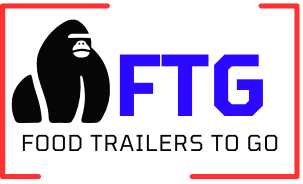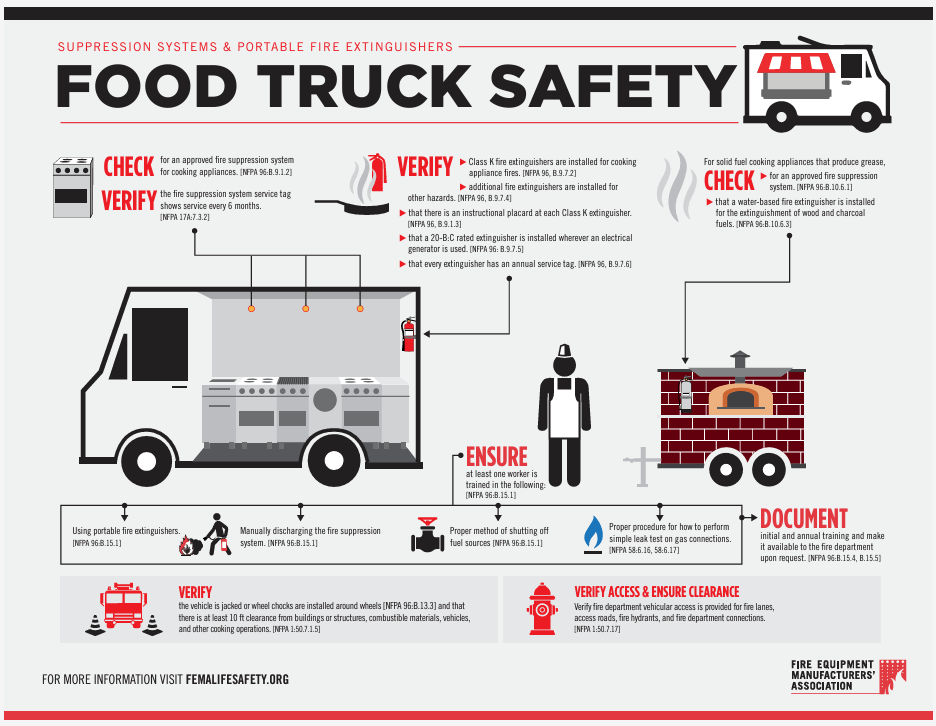Operating a food trailer is an exciting and rewarding venture. It allows you to serve creative dishes to diverse customers in unique locations. However, with this flexibility comes the responsibility of ensuring the safety of your team and customers. By following essential safety practices, you can prevent accidents, maintain compliance with health regulations, and build a trusted reputation in the food industry.
Why Safety is Critical in Food Trailer Operations
Safety is not just about preventing accidents; it’s about creating an environment where customers feel confident and employees can work efficiently. A single safety lapse can lead to food contamination, injuries, or damage to your trailer, jeopardizing your business’s future. As a business owner, it is essential to implement robust safety protocols and continually update them to stay ahead of potential risks.
Key Benefits of Prioritizing Safety:
- Protect your team and customers from harm.
- Avoid costly fines due to non-compliance with regulations.
- Enhance customer trust and loyalty by demonstrating a commitment to their well-being.
- Prevent equipment damage and downtime.
Establishing a Safe Work Environment Inside Your Food Trailer
A well-organized and safe workspace is the foundation of smooth operations. Food trailers often have limited space, making it critical to arrange equipment and supplies efficiently.
Tips for a Safe Workspace:
- Organize Your Layout: Arrange cooking appliances, utensils, and storage areas to minimize movement and reduce the risk of trips and burns.
- Secure Loose Items: Use hooks, shelves, and non-slip mats to prevent items from shifting during transit.
- Ensure Proper Ventilation: Install exhaust fans and vents to remove smoke, grease, and fumes, ensuring clean air circulation.
- Invest in Quality Equipment: Use durable and certified cooking appliances to reduce the likelihood of malfunctions.
- Maintain Clean Surfaces: Regularly clean countertops, floors, and cooking areas to prevent cross-contamination and pest infestations.
Food Trailer Safety Checklist
| Safety Measure | Frequency | Reason |
|---|---|---|
| Clean cooking surfaces | After each shift | Prevent food contamination |
| Inspect fire extinguishers | Monthly | Ensure readiness during emergencies |
| Check electrical connections | Weekly | Avoid electrical hazards |
| Restock first aid kit | As needed | Handle minor injuries promptly |
| Train employees on safety | Quarterly | Update skills and reinforce protocols |
Ensuring Food Safety: Protecting Your Customers
The cornerstone of any successful food trailer is serving food that is both delicious and safe. By following health standards, you protect your customers from foodborne illnesses and build your business’s reputation.
Essential Food Safety Practices:
- Temperature Control:
- Keep cold foods at or below 40°F.
- Maintain hot foods at or above 140°F.
- Use food thermometers to monitor temperatures during preparation and storage.
- Proper Storage:
- Store raw ingredients separately from cooked foods.
- Label all items with preparation and expiration dates.
- Hygiene Standards:
- Ensure all employees wash their hands thoroughly before handling food.
- Use gloves when appropriate and change them frequently.
- Avoid Cross-Contamination:
- Clean and sanitize cutting boards, knives, and utensils between uses.
- Assign separate tools for handling raw and cooked foods.
- Regular Health Inspections:
- Stay compliant with local health codes by scheduling regular inspections.
- Address any violations promptly to avoid penalties.
Fire Safety: Protecting Your Trailer and Team
Fire hazards are a significant concern for food trailers, given the extensive use of cooking appliances and gas cylinders. Adhering to fire safety protocols can prevent catastrophic incidents.
Fire Safety Guidelines:
- Install Fire Suppression Systems: Equip your trailer with automatic fire suppression systems designed for kitchen environments.
- Keep Fire Extinguishers Handy: Place extinguishers within easy reach and ensure your team knows how to use them.
- Inspect Gas Connections: Regularly check propane tanks, hoses, and fittings for leaks or damage.
- Turn Off Appliances: Always turn off cooking appliances and gas supplies when not in use.
- Educate Your Team: Train your staff to handle fires, including how to evacuate customers safely.
Electrical Safety: Preventing Shocks and Fires
Food trailers rely on various electrical appliances to operate efficiently. Ensuring these systems are safe is crucial for avoiding electrical hazards.
Electrical Safety Tips:
- Use Grounded Outlets: Install outlets with ground fault circuit interrupters (GFCIs) to prevent electrical shocks.
- Inspect Cables and Plugs: Check for frayed wires and loose connections regularly.
- Avoid Overloading Circuits: Distribute power usage across circuits to prevent overheating.
- Keep Water Away: Place electrical equipment away from sinks and wet areas.
- Hire a Professional Electrician: For installations or repairs, consult certified electricians.
Employee Training: Building a Safety-First Culture
Your employees are your first line of defense in ensuring safety. Regular training empowers them to handle emergencies effectively and follow best practices consistently.
Training Essentials:
- First Aid and CPR: Equip your team with the skills to respond to medical emergencies.
- Fire Drills: Conduct drills to familiarize employees with evacuation routes and extinguisher use.
- Food Handling Certification: Encourage employees to obtain certifications in food safety and handling.
- Equipment Training: Provide hands-on training for operating and maintaining appliances.
- Customer Interaction: Teach employees how to handle complaints or concerns professionally.
Customer Safety: Enhancing Their Experience
Customer safety is as important as employee safety. Ensuring a safe environment for your patrons fosters trust and encourages repeat business.
Practices for Customer Safety:
- Design a Safe Serving Area: Use barriers or counters to separate cooking zones from customer spaces.
- Provide Clean Utensils: Use disposable utensils or sanitize reusable ones between uses.
- Display Health Certifications: Assure customers of your compliance with safety standards.
- Offer Clear Signage: Display allergen warnings and food descriptions to help customers make informed choices.
- Monitor Crowd Management: Ensure orderly queues and prevent overcrowding near the trailer.
FAQs About Safety Practices for Operating a Food Trailer
1. What are the most common hazards in a food trailer?
The most common hazards include fire risks, food contamination, electrical shocks, and slips or falls due to limited space.
2. How often should I inspect my food trailer for safety?
Conduct daily checks for cleanliness and equipment functionality, weekly inspections for electrical and gas systems, and monthly reviews of fire extinguishers and other safety equipment.
3. What equipment is essential for food trailer safety?
Key equipment includes fire extinguishers, first aid kits, food thermometers, non-slip mats, and proper ventilation systems.
4. How can I ensure compliance with health codes?
Stay updated with local regulations, schedule regular inspections, and maintain detailed records of cleaning and safety practices.
5. What should I do in case of a fire in my food trailer?
Turn off the gas supply, use a fire extinguisher to control the fire if it’s small, and evacuate immediately if the fire spreads. Call emergency services for assistance.
6. Can I train my employees on safety protocols in-house?
Yes, you can provide in-house training, but consider hiring professionals for specialized training in fire safety, first aid, and equipment handling.
7. Why is temperature control important in food safety?
Temperature control prevents the growth of harmful bacteria, ensuring food remains safe for consumption.
8. How do I handle customer complaints about food safety?
Listen to the complaint carefully, address their concerns professionally, and investigate the issue to prevent future occurrences.
Conclusion
Implementing Essential Safety Practices for Operating a Food Trailer: Protect Your Team and Customers is the cornerstone of a successful and trustworthy food trailer business. By prioritizing safety in all aspects—from food preparation to customer interaction—you not only safeguard your operations but also build a loyal customer base. For custom food trailers designed with safety in mind, visit Food Trailers to Go. Their expertise in crafting efficient and secure food trailers will help you create a thriving mobile culinary venture.

